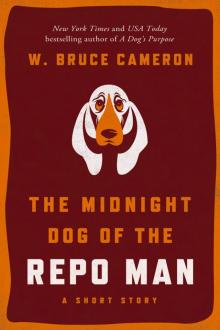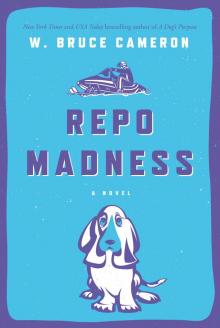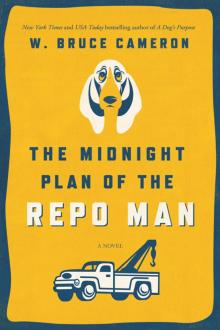- Home
- W. Bruce Cameron
Repo Madness Page 2
Repo Madness Read online
Page 2
“Who, Katie? That I had her father talking in my head for a while? No, I guess none of the bridal magazines in your lobby suggested I should bring it up. He’s gone now, anyway. Alan, I mean.”
“Which makes you sad.”
“What? No! Where do you get that? Did Sheryl say that?”
“Your reaction is interesting. Your … vehemence. Why do you deny it with such force? Would there be shame if you missed the voice?”
“Shame? No, of course not.”
“Then what is the matter with admitting you might, at times, regret you no longer hear the voice?”
“What is the matter?” I repeated incredulously. “If I went around saying I used to hear a voice and I want him back? People would think I was crazy.”
“Well…” Schaumburg gave a lazy shrug. “People. Perhaps. But in here, I think it is important to probe these areas.”
“Okay, sure. Let’s probe.”
“What do you want to tell me about how you feel about the voice? Today, I mean.”
“I want to tell you that the voice is gone,” I replied firmly.
He looked amused. “All right, then.”
I glanced longingly at the door. The clock said I had to endure just a few more minutes of this.
“Tell me about when Alan would control your body,” Schaumburg prodded after neither of us had spoken for an awkward while.
“That only happened a couple of times. I would be asleep, and he would sort of take my body out for a spin. He never did anything bad with it. Like, he would fold the laundry, stuff like that.”
Another long silence. I regretted bringing up the laundry—it made me sound pretty crazy somehow, even though doing my shirts was Alan’s idea.
“I’m not able to find anything like your case in the literature,” Schaumburg told me. “Schizoaffective disorder, which is how Dr. Johnston has classified your condition, is entirely separate from dissociative personality disorder, though people commonly make the mistake of believing schizophrenia means having a so-called split personality. In other words, patients never describe their alter ego as a voice; they just morph from one personality to another, spontaneously and, sometimes, conveniently.”
“I see we’re out of time and I’m sorry I was late,” I replied sincerely. “It took longer to get that bat out of his hands than it should have.”
“Did you hit him with it?”
“What? No. That’s not how it’s done. You think I would last long in this profession if I went around braining people with a baseball bat?”
“What if Alan were running your body: Would he hit someone with a bat?”
“Alan?” I laughed. “No. A badminton racquet, maybe. Or he’d write them an angry note.” I stopped chuckling at Schaumburg’s expression.
“You really miss him, don’t you?”
I wasn’t buying the sympathy. This guy was playing me, and I needed to pay more attention before I talked myself into trouble. “He’s gone,” I responded unequivocally.
“There have been cases where people miss the voices; they crave their delusions. You’ve perhaps seen the movie A Beautiful Mind? It’s even hypothesized that some patients could so yearn for the return of their imaginary companions that they re-create the voice. Bring them back, in other words.”
“Sounds like something we should talk about next time,” I noted amiably, standing up.
“Why don’t you sit down? I have some time before my next appointment.”
It didn’t sound like a suggestion. I sat, flexing and unflexing my fists on my knees.
“What is your pharmacist going to tell me when I call him to find out the last time you filled your prescription?” Schaumburg asked.
“Tom? That I was just in there last week,” I replied with all the truthfulness my soul could muster. I had, in fact, been in there just four days ago, getting some medication for Katie.
“All right, Ruddy. I’m your doctor and interested in what is best for you. But if I call your pharmacist and find that, as I suspect, you have not been getting your medications, I’m going to report your lack of cooperation to the court. And you do know what that means, don’t you?”
I licked my lips. “It means I would go back to jail,” I finally rasped. I believed this bastard would do it, too—put me behind bars just for not taking some stupid pills.
“I’m glad we understand each other,” Schaumburg said.
I thought about giving him the stare I had successfully used to close down bar fights and get people to hand over their unpaid-for cars, but I knew it wouldn’t work here. Schaumburg had all the power. In the end, I just stared at him helplessly.
I did not know what I was going to do.
2
Why Would Anyone Do That?
I jabbed at my cell phone. I used to hate the damn things—my fingers are too big for the tiny buttons on the screen, coverage is lousy when I’m in the backwoods, and they have a tendency to break when I get pissed off and stomp on them. I swore I would never replace the one I threw out of the truck window a while back. Then I got a girlfriend, who outvoted me.
I get outvoted on a lot of things.
I phoned the pharmacy, and Tom answered. I pictured him on the other end of the phone call: He looks so much like a pharmacist, I’m sure he knew as a kid that’s what he would wind up doing. He was probably born wearing a white coat and a mustache. I told him what I wanted him to do for me, and he became pretty uncomfortable.
“See, Ruddy, the thing is, your doctors are sort of the head of your health care team. I pretty much can’t refuse to talk to them, and if they ask about your medications, I can’t say you’re getting them refilled when you haven’t actually ever done it,” he told me apologetically.
“Could you stall for a few days, so I could get in there and pick them up?”
“I think we already got a call. From a Dr. Schaumburg? He asked me to phone him back. Said it was pretty important we speak today.”
I was parked in the clinic lot in Traverse City, where a light snow had fallen and frozen on my truck windshield, adding to the film of ice already there. My heater was on full blast, blowing air that carried only a hint of warmth. Two small circles of clear glass had formed right above the defroster vents, and I leaned down and peered through these at cars creeping by on the snow-packed streets. Only five in the evening, and the night was already settling in—this far north the sun can hardly be bothered to make an appearance in January. I could not possibly make it to Kalkaska before Tom closed.
“Could you maybe wait until tomorrow to call him back?” I asked hopefully.
“Ruddy…”
“I need a little help here, Tom. Dr. Johnston never even asked about my medications, but this new guy is a hard-ass.”
Tom was silent in a way that suggested to me that he was turning something over in his mind. “New guy,” he mused.
“Right. I guess Sheryl was in a skiing accident.” I unconsciously rubbed my knee.
“The thing is, there’s a protocol for him to follow. Dr. Schaumburg, I mean. I’m not supposed to discuss your medications with him until I get something from Dr. Johnston’s office.”
I seized it. “Right! This guy could be an imposter, pretending to be my doctor to extract information from you!”
“But why would anyone do that?”
“Look, Tom, I think the important thing here is that you make this Schaumburg prove he is who he says he is. Meanwhile, I’ll come in and pick up my medications tomorrow.”
Tom was silent again.
“What is it?” I probed as pleasantly as I could.
“Ruddy, you never picked up the prescription. I couldn’t fill it now.”
“Look. This Schaumburg guy says he wants to send me back to jail. For not taking medication! That’s not America, that’s like…” I tried to think of a country where it was illegal not to take pharmaceuticals. Jamaica? “It’s just un-American,” I finally finished.
“I can’t lie to a docto
r,” he whined.
“I’m not asking you to lie. Not exactly.” Though I wished he would. I bit my lip. “You just tell Dr. Schaumburg you can’t discuss my case without the authorization, and I’ll think of something.”
Tom agreed that he could at least do that much. I hung up, feeling a sweat break out on my forehead despite the frigid temperature in the truck cab. “Okay, I bought myself a day,” I said aloud.
I sort of got into the habit of talking to myself back when I had Alan in my head. A lot of people talk to themselves. It doesn’t mean I need to be on antipsychotic medication. Schaumburg could kiss my ass. “There’s nothing wrong with me!” I yelled. A woman walking past at that moment heard me through the windshield and frowned in my direction, reflecting disbelief at my statement.
“I’m pretty sure people who talk to themselves sometimes yell,” I muttered to myself.
My wipers rasped across the ice, which showed no sign of breaking up. I called my boss, Milt Kramer, to see if any of the customers I was hunting for had decided to drop off their vehicles. No, but he had a new assignment for me.
“Mark Stevens. Seventy days past due, eleven hundred dollars. I’ll text you the vehicle description. Mail comes back no forwarding, no phone. Bank says collect or pull it in.”
“Stevens? The handyman guy?”
“He put contractor/builder/architect on his application.”
“I know him. He’s probably living with his friend Kenny; shouldn’t be too hard to find.”
Milt grunted. “Bank says he’s pretty much been past due from day one.”
“That’s Mark.”
“You, uh, had your doctor appointment?”
“Yeah, but it was a new guy, a Nazi.”
“Oh. You tell him about Repo Madness?”
“No, because there’s no such thing. You made it up. I tell the doctor about your diagnosis, he’s going to want to put you on medication.”
“I did not make it up. I’m telling you, enough time stealing vehicles, and the madness sets in. I saw a guy bigger than you just break down and sob right on the street. He had to leave the business, wound up teaching high school, poor bastard.”
“Did this crybaby hear voices?”
“He wasn’t a crybaby, for God’s sake. He had Repo Madness, is what I’m telling you. Now, you still got your nerve, I give you that, but with voices in your head, telling you to join a commune, become a nudist, get a cat…”
“I don’t have the voice anymore, and he never said to do any of that.”
“Then why are you going to a psychiatrist?” Milt rejoined slyly.
“All right. Next time I see the doctor, I’ll tell him I’ve got Repo Madness and I’m afraid it’s going to make me cry.”
Milt snorted. After my dad died, Milt sort of became a father figure to me, and banter like this was how we expressed affection for each other. “Hey, uh, Ruddy,” he said in a change-the-subject tone. “I’m meeting my nephew for drinks after work, but not at the Black Bear, a different place.” His voice sounded guarded.
The Black Bear was my sister’s bar, where I worked as a bouncer. Milt’s nephew Kermit had just married my sister, so whatever was going on sounded as if it was some sort of family stuff. I don’t mind drama as long as I don’t have to hear about it. “That’s up to you, Milt. I won’t tell Becky.”
“Well, on Mark Stevens, get the money or the car. Copy?”
“I’m not saying ‘copy,’ Milt. We talked about this.”
I disconnected and thought briefly about Mark and Kenny. The first time I ever met them, they both stuck guns in my face, but I sort of liked them anyway. I would be sorry to repo Mark’s truck.
The Black Bear on my mind, I called in to see if any bar fights needed to be broken up. My friend Jimmy answered—my sister, Becky, had hired him to greet customers and serve food, and it was working out really well. Jimmy was handsome, almost ridiculously so, and had the perfect personality for food service—the first time he’d ever had a job for which he’d displayed any actual talent. He laughed when I asked him if my services as a bouncer were required—my sister had remodeled the place and turned it from a dingy saloon into a family restaurant where “happy hour” actually meant “happy” and not “a bunch of unemployed guys getting drunk and then punching each other.” I was starting to feel pretty useless as a bouncer—not too many parents want you to put their toddlers in a hammerlock. The only altercations I had broken up recently had been between the Wolfingers, a couple who had been passionately arguing since the day they got married.
“I’m going to head over to the Smeltania festival,” I told Jimmy.
“What’s that?”
“You know, Boyne City? They put the ice shanties out on the lake today. Smeltania.”
“Smelt? You mean the little fish?”
“Right. Hence, Smeltania.”
“I thought they called it Shantytown.”
“That is what most people call it,” I admitted. “But the whole thing started because of the smelt runs. They elect a temporary mayor, have a post office out on the ice—it’s a big deal.”
“Sure,” Jimmy said absently.
“So you’re patronizing me now?”
“Huh?”
“My fiancée swing by?”
“Haven’t seen Katie, no,” Jimmy replied.
For Katie not to show up at the Bear was not terribly unusual, but we’d had a few disagreements over things lately, and I couldn’t help but read some bad news into her absence. It was on my mind to ask Jimmy for some advice—he’d had a lot more experience with women than pretty much any single man in Kalkaska—but I wasn’t sure how to phrase the question. That was the thing about women: I’d been studying them my whole adult life and knew less about them than when I’d started.
“Hey, so, after you’ve been to the Shantytown festival, are you coming to the Bear?” he asked.
“Maybe, yeah. Why?”
“I’m sort of in trouble, Ruddy.”
I groaned a little. “What did you do, Jimmy?”
“Can we talk about it in person?”
I told him sure, but I hung up with a sense of foreboding. When we were kids, I had always been something of a big brother to my friend, and had helped him out of a lot of messes. But he was an adult now, and his problems were usually a lot more complex than when he would get a girl to do his homework and then turn it in, in her handwriting.
Finally my heater had grown some balls and was turning the frozen layer on my windshield dark with meltwater. When I flipped on the wipers, the ice fragmented into islands that broke and slid away. I turned on my headlights and chugged out of the parking lot and into the night.
Despite the cold, the Smeltania festival would be well attended, with Christmas lights, lots of vendors in heated tents, live music from shivering musicians, and plenty of alcoholic beverages. I wasn’t going there to party, though. I had a different purpose in mind.
I was going to see if I could contact Alan Lottner.
* * *
The snow let up by the time I arrived at Boyne City, a pretty town of about four thousand people that grew up around the logging and fishing industry because the Boyne River flows into Lake Charlevoix right there. Once the logs and the fish were pretty much gone, the town fell on rough times, but it had recently reinvented itself around upscale condos, yacht slips, and fancy restaurants. I wandered the festively decorated streets, stopping for a burrito at the Red Mesa Grille, idly walking through the parking lots to see if any of my current clients had driven their cars over to be stolen. Strings of lights lit up the snow, guiding the people, who wore bulky coats and wandered around greeting each other heartily, happy in hypothermia.
A guy stood on a flatbed trailer and explained the history of Smeltania to a small gathering of people. The story was about as dramatic and exciting as a bunch of flimsy shelters on naked ice could possibly be. When the smelt went away, so did the “town’s” name, but the shanties remained because f
or some people, nothing is more entertaining than sitting for hours at a time on a bucket and watching a hole cut in a frozen lake. Now some smelt had returned, and a huge banner gamely welcomed everyone to Smeltania, but the locals still called it Shantytown.
After the speech, a children’s choir sang an original song that had been written by someone who had clearly never before composed music. I clapped my mittened hands when they were finished.
Vendors were selling handmade jewelry and Native American artifacts from China, and T-shirts with slogans on them. The woman I had come to see was Madame Revard, and her tent had a thick curtain of beads hung over the entrance.
“Come in,” a woman’s voice invited. Madame Revard, I presumed. I pushed the beads aside and entered. There was room inside to park two pickup trucks, which had sort of become a unit of measurement for me—occupational skill or Repo Madness, take your pick. A kerosene heater cranked out heat and a faint petroleum odor, and a bunch of candles provided glowing illumination. The whole thing looked like a huge fire hazard.
Madame Revard resembled pretty much everyone else in northern Michigan, a short woman with skin pale from lack of sun. She wore a pendant that hung on her forehead, as if she’d been trying to put on a necklace and it had gotten stuck. Her earrings matched the pendant, and she had a thick ring or two on every finger. Over time, I’ve noticed a corollary between the size and number of gaudy rings a woman wore and the likelihood I’d be repossessing her car. I decided to keep this piece of information to myself.
“Welcome,” she murmured. “Did you come for a specific reason, or are you just curious?”
“You’re a medium, the kind who helps people contact the dead?”
“I speak to those who have departed, and if they choose, they communicate back. Would you like to try?”
“Try. Sure.”
“I ask for my fee in advance so that it is out of the way and not a distraction,” she said smoothly. “Fifty dollars, and we will get started.”
I gave her two twenties and a ten. I mean, why the hell not?

 Bailey's Story: A Dog's Purpose Novel
Bailey's Story: A Dog's Purpose Novel A Dog's Purpose
A Dog's Purpose Ellie's Story
Ellie's Story A Dog's Way Home
A Dog's Way Home Molly's Story
Molly's Story A Dog's Journey
A Dog's Journey The Dogs of Christmas
The Dogs of Christmas A Dog's Perfect Christmas
A Dog's Perfect Christmas Lily to the Rescue: Lost Little Leopard
Lily to the Rescue: Lost Little Leopard Bella's Story
Bella's Story Lily to the Rescue
Lily to the Rescue Lily to the Rescue: The Not-So-Stinky Skunk
Lily to the Rescue: The Not-So-Stinky Skunk A Dog's Courage--A Dog's Way Home Novel
A Dog's Courage--A Dog's Way Home Novel The Midnight Dog of the Repo Man
The Midnight Dog of the Repo Man The Dog Master: A Novel of the First Dog
The Dog Master: A Novel of the First Dog Emory's Gift
Emory's Gift Lily to the Rescue: Two Little Piggies
Lily to the Rescue: Two Little Piggies Lily to the Rescue: The Misfit Donkey
Lily to the Rescue: The Misfit Donkey Lily to the Rescue: Foxes in a Fix
Lily to the Rescue: Foxes in a Fix Lily to the Rescue: Dog Dog Goose
Lily to the Rescue: Dog Dog Goose Max's Story
Max's Story A Dog's Purpose Boxed Set
A Dog's Purpose Boxed Set Toby's Story
Toby's Story Repo Madness
Repo Madness The Midnight Plan of the Repo Man
The Midnight Plan of the Repo Man Shelby's Story
Shelby's Story The Dog Master
The Dog Master Bailey's Story
Bailey's Story